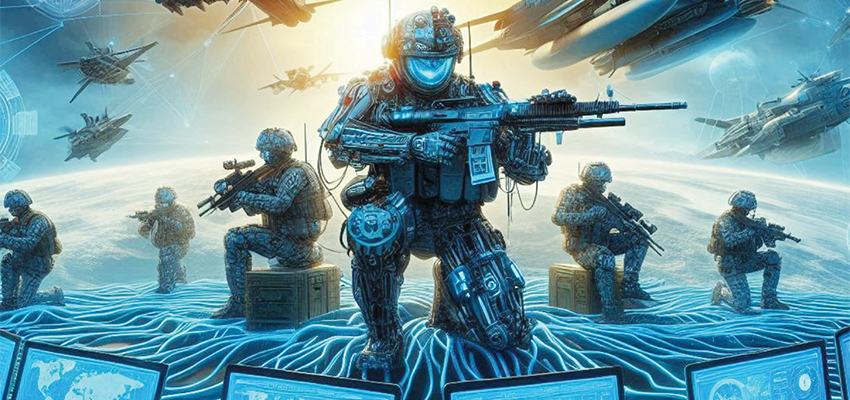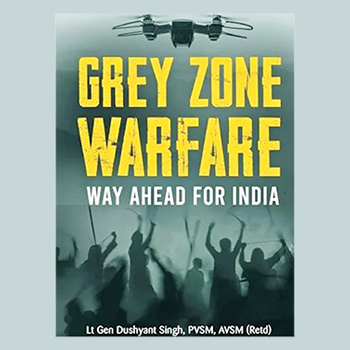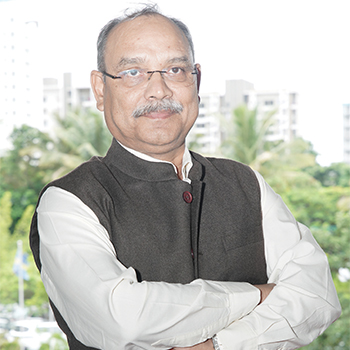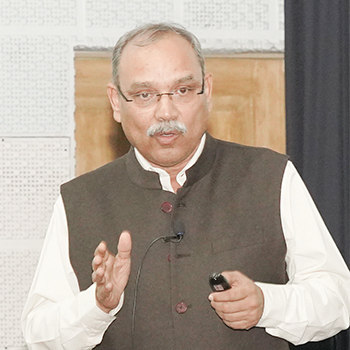The Scholar Warrior

Lt. Gen. Dushyant Singh PVSM, AVSM (retd.), Director General, Centre for Land Warfare Studies (CLAWS), has had a distinguished military career, beginning with his commissioning into the 9th Battalion of the Maratha Light Infantry Regiment, in December 1981. A well- acclaimed officer, Lt Gen Singh is an alumnus of prestigious institutions such as the National Defence College (NDC), Defence Services Staff College (DSSC), College of Defence Management (CDM), and Naval Postgraduate School in California, USA. He has attended the Regional Defence Counter Terrorism Programme with specialisation in Terrorist Operations and Financing in USA.
Throughout his service, Lt Gen Singh has operated in diverse terrains, both in India and abroad as a United Nations Military Observer. Notably, he has served twice in the elite National Security Guards, holding the roles of Deputy Inspector General (Operations) and Inspector General (Operations).
Beyond his military career, Lt Gen Singh is a prolific writer and contributor to various defence journals and newspapers. He has authored chapters in books like Understanding Suicide Terrorism and Countering Terrorism: Psychological Strategies. An avid reader, writer, and sportsman, he continues to share his insights through his website. He spoke to Corporate Citizen, giving an insightful information on CLAWS and his professional journey
Corporate Citizen: Tell us about your early life.
Lt. Gen. Dushyant Singh: I was born in Gambhirban village, in Azamgarh district of Uttar Pradesh (UP). The school there wasn’t much to speak of, and until the fourth standard, I didn’t have a formal, well-grounded education. I didn’t even know Hindi well at the time, as I spoke Bhojpuri. Eventually, I was enrolled in Kendriya Vidyalaya, but they didn’t accept me, so I went to a Indian Railway school. It was a struggle to get a proper education, and it took me 4-5 years to stabilise and become a better student. My father then sent me to Delhi, where I completed my IX, X, and XI grades. It was in Delhi that I received a good educational grounding.
After that, I pursued my graduation and was selected for the Indian Military Academy (IMA). However, due to some medical issues, I couldn’t join at that time. I took care of my medical issues, completed my graduation, and then joined the army. I completed one-and-half-years at IMA and was commissioned into the Maratha Light Infantry Regiment, in December 1981.
I’ve been fortunate in my career, as I didn’t have to repeat any training or assignments; I succeeded in everything on the first attempt. Initially, I struggled, but later on, life provided me with opportunities. I had the chance to visit numerous foreign countries and work in various capacities, gaining experience in international military settings, including in the US, UK and Europe. This international exposure has been invaluable in carrying out my functions. I’ve commanded a corps, a division and a brigade, all in Jammu and Kashmir, and these are higher appointments that come after unit command. I also had the opportunity to do staff work and served twice with the National Security Guard (NSG) as DIG and IG.
CC: How did you get into serving the National Security Guard?
I have had a very colourful and diverse experience, more so than many typical army or service officers. My time with the NSG has also given me exposure to police-type duties, adding another dimension to my background.
After leaving the service, my experience shifted; for about 2-3 years, I was freelancing and writing on national security topics. I even wrote a book, Grey Zone Warfare - Way Ahead for India, sharing the knowledge I gained throughout my career. The book has been well-received and is one of the few in India on the topic. So, whether in active duty or in civilian life, my aim remains to contribute meaningfully to national security and preparedness.
CC: What does “Grey Zone” in warefare mean?
“Grey zone” refers to a type of warfare that exists between the states of war and peace. In grey zone conflicts, adversaries engage in hostile actions without openly declaring war. This can include cyber-attacks, narrative warfare, information operations, covert operations, and creating internal dissension within a country. The goal is to weaken the adversary without direct confrontation. Countries may employ proxies or encourage third parties to conduct actions like terrorism. For example, China might indirectly support terrorism by providing arms or resources to groups in another country, such as Pakistan or insurgent groups in India’s northeast, without direct involvement. This indirect method of creating instability and conflict, without formal declarations of war, is the essence of grey zone warfare.
"Whether in active duty or in civilian life, my aim remains to contribute meaningfully to national security and preparedness"
- Lt. Gen. Dushyant Singh (retd.)
CC: Can you give us some examples of grey zone warefare?

This phenomenon is occurring worldwide, marking a new era and form of warfare. In my book, I’ve discussed various countries, including China, the US, Russia, Iran, Israel, and Pakistan, all of which have engaged in grey zone warfare. For instance, regime changes can be considered a part of this. By orchestrating or supporting regime changes, countries can destabilise others without direct military intervention.
A specific example is the Maldives, where a regime change resulted in a government less favourable to India, benefitting China. This kind of subtle, indirect influence and manipulation is a hallmark of grey zone warfare, as it achieves strategic objectives without open conflict.
CC: India has been ranked as the fourth strongest military in the world. How does India’s military measure up against other armies in the world?
In essence, the goal is the same for everyone, whether in the US or India: to ensure preparedness for any potential threat and to handle tasks effectively without waiting for things to go wrong. This applies both in service and out of service.
CC: What is the role of Artificial Intelligence (AI) in warfare?
AI is the new buzzword in technology, applicable across various fields, not just military or civilian sectors. AI is not a form of warfare but a technology that can be used in countless ways. It can accelerate learning, increase work efficiency, and enhance specific tasks. For example, in defence-related activities, AI can analyse vast amounts of data in minutes, a task that might take hours if done manually.
AI involves deep machine learning with multiple layers, enabling more potent and efficient outcomes in various functions. Its ability to significantly enhance productivity and effectiveness makes it increasingly valuable in different industries and applications.
CC: Is AI getting implemented in the Indian Armed Forces?
AI is increasingly being applied in the Indian armed forces. For instance, on the battlefield, AI manages a variety of sensors, weapon systems, and surveillance systems through digital platforms. This involves handling large amounts of data, which, if processed quickly, can lead to faster decision-making and more effective action.
AI plays a role in managing data, weapon systems, equipment and logistics. For example, in the past, manual communication was used, but now AI systems can automate and optimise these processes.
A notable example from another country is Israel’s AI Lavender system. This program uses AI to analyse data on suspected terrorists. If a soldier encounters someone and uses the app to check their identity, the AI can confirm whether the individual is a terrorist and issue an immediate order to act. This reduces the need for a commander’s direct order. However, there are ethical concerns with AI in warfare, such as potential errors and the need to address ethical implications. Despite these concerns, AI is being actively used and planned for in defence applications.
CC: What is the role of CLAWS in bolstering Indian Army’s research capabilities in land warfare studies?
CLAWS is an independent think tank under the aegis of the Indian Army, established in 2004 as Oscar Cell, and was subsequently registered as a society under the Societies Act. CLAWS focuses on issues and areas of study related to warfare in general, with a particular emphasis on land warfare. It also addresses ongoing issues and problems faced by the Indian Army, conducts studies and reports, and organises seminars. In essence, it operates like any other think tank.
CC: Does the think tank have any precise focus on the next action plan or the future of army strategy in terms advancing military technology and innovations?
The think tank’s focus covers a wide spectrum, including international affairs, regional issues, and national security, all of which may impact warfare. It specifically looks at issues related to warfare, such as terrorism, grey zone conflicts, conventional and unconventional threats. The think tank studies how these areas are currently manifesting and how they may evolve in the future. To achieve this, it conducts seminars, project studies, and commissions books on topics related to national security and land warfare. The essential focus is to provide intellectual capital to the Indian Army and other armed forces.
CC: Does CLAWS have a flagship journal?
Yes, in fact we have several publications. Our flagship journal, known as the ‘CLAWS’ Journal, is published every six months. In addition, we have another journal called ‘Scholar Warrior’, which serves as a platform for young researchers and officers to write about military problems, international issues and other related topics. This journal also comes out twice a year. So, in total, we publish four journals annually: two are flagship journals, and two are targeted towards younger contributors. The main journal is called ‘CLAWS’ and the second one is ‘Scholar Warrior’.
"Unlike working in a corporate job, where you might get pigeonholed into a specific role, the military provides adventure, independence, and the thrill of facing challenges"
CC: What is the spectrum of domains and wings that CLAWS cover?

CLAWS has evolved into a well-structured organisation over time. Initially, it started as a small group focused on military research, but now it has a more formal structure. The organisation is headed by a Director General, currently me, and an Additional Director General.
We have various wings, including:
Research and Academic Wing: This wing includes civilian scholars, who are selected based on advertisements, and who specialise in areas like international relations, warfare, maritime issues, terrorism and grey zone conflicts. It also includes serving officers on study leave, known as Senior Fellows, who are generally of the rank of colonel. We have ten such Senior Fellows.
Administrative Wing: This wing handles the organisation’s administration, including financial management and office functions. It is headed by a retired colonel who manages the day-to-day operations.
Promotion and Examination Department (Promex):
This department provides study material and support to Indian Army officers preparing for mandatory promotional exams, which are crucial for their career progression and seniority.
Together, these wings and departments form the core group of CLAWS.
CC: In what way does Promex support Indian Army officers in preparing for mandatory promotional exams?
We provide study material, updated annually, to help officers prepare for their exams. This is because they are often busy with field duties, such as counter-terrorism and counter-insurgency operations, and don’t have much time to conduct their own research and preparation. We send them the material by mail for their use.
Additionally, we have a pool of distinguished fellows who tackle significant issues, often referred to as the “Serious Stuff.” This includes major problems faced by the Indian Army or other organisations like the National Security Council, which may ask us to study specific issues and propose solutions. Our fellows include retired military officers, academicians, and ambassadors, both based in Delhi and across India. They contribute to our research and analysis efforts.
CC: What are the visible outputs of CLAWS?
CLAWS, as an independent think tank, produces several visible outputs:
Reports and Solutions: We address problems presented to us by providing detailed reports or solutions. These can be disseminated in various formats such as journals, books, reports, or papers. If the material is not classified, it is published on our website. Classified information is shared only with the concerned agency and is not made public.
Seminars: We conduct seminars on current issues. One of our notable events is the Annual International Seminar, which has a standard similar to the Raisina Dialogue. This two-day seminar, which started last year, will continue this year with the theme “Fueling Growth and Development through National Security”. The seminar features six sessions, including four special talks with well-known personalities from countries like the US, Russia, Israel, Bangladesh, Nepal, Sri Lanka, and other Asian countries. These sessions provide a global perspective on India and include both international and Indian scholars, military experts, and diplomats.
"AI is not a form of warfare but a technology that can be used in countless ways. It can accelerate learning, increase work efficiency, and enhance specific tasks"
CC: What would you suggest for those who would like to join the Indian Armed Forces?

If you’re considering joining the armed forces, think about it as a path to becoming a well-rounded individual. The armed forces offer a broad range of experiences and opportunities that you might not find in other careers. Unlike working in a corporate job, where you might get pigeonholed into a specific role, the military provides adventure, independence, and the thrill of facing challenges. For instance, I’ve had life-threatening experiences, including being kidnapped as a UN observer in Africa. Such situations, while dangerous, come with a unique thrill and adrenaline that you won’t find elsewhere.
CC: How does the experience in the armed forces compare to other careers in terms of personal growth and opportunities?
The armed forces offer unparalleled opportunities for personal growth and development. Beyond the excitement and adventure, you also get to engage in scholarly work and gain advanced education, such as my own postgraduate studies in America. The exposure you get is extraordinary—you meet people from across India and around the world, and you experience life in ways that are often more enriching than traditional career paths. Joining the armed forces provides a chance to travel, face unique challenges, and contribute meaningfully to your country, making it a fulfilling and transformative experience.
CC: What is the philosophy of life that you live by?
My philosophy is a bit unconventional. I consider myself a happy-go-lucky person who lives life one moment at a time.
CC: Do you have any long-term goals or visions?
Yes, I do have big visions, but I don’t focus on them all at once. Instead, I break them down into smaller, manageable steps. I achieve these steps one by one, and each time I reach a milestone, I’m content and then focus on the next step.